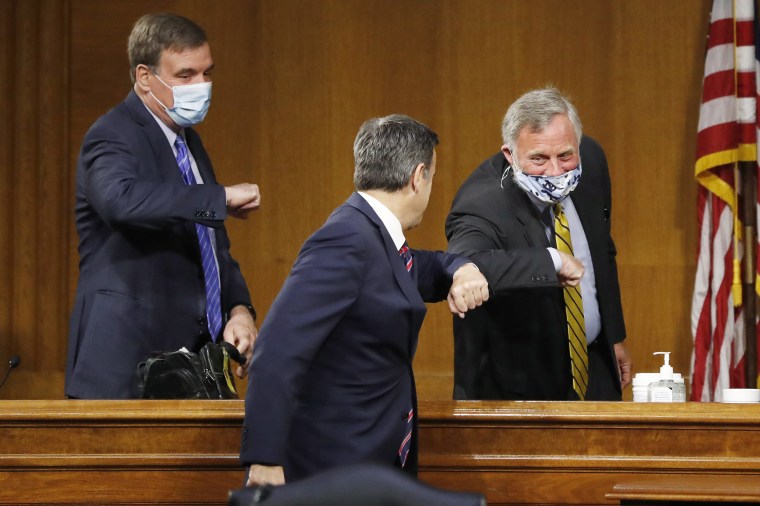WASHINGTON — In a final act before stepping down as chairman, Sen. Richard Burr, R-N.C., has asked the Trump administration to quickly declassify the last portion of the Senate Intelligence Committee's bipartisan report on Russian election interference, a 1,000-page volume on the committee's "counterintelligence findings."
In a joint announcement with ranking Democrat Mark Warner of Virginia, Burr noted that President Donald Trump's nominee to be director of national intelligence, Rep. John Ratcliffe R-Tex., "affirmed his commitment as DNI to an expeditious review of the committee's report" during his May 5 confirmation hearing. Ratcliffe is expected to be confirmed.
Burr has agreed to step down as intelligence chairman while the FBI investigates whether he sold stock based on inside information about coronavirus. In Friday's statement, he and Warner thanked committee staff for having "greatly added to our understanding of and response to foreign threats to our democratic process."

Although the Senate committee did not find evidence of a conspiracy between the Trump campaign and Russia — something NBC News first reported in February 2019 — this volume is the first bipartisan examination of the 2016 Trump campaign's repeated and oft-criticized interaction with Russians, some of whom were offering help in defeating Democrat Hillary Clinton.
A detailed re-examination of that saga in the thick of the 2020 election campaign could be embarrassing for Trump and his Republican allies.
Special counsel Robert Mueller's investigation found numerous contacts among Trump aides and Russians, but no conspiracy.
"Although the investigation established that the Russian government perceived it would benefit from a Trump presidency and worked to secure that outcome, and that the Campaign expected it would benefit electorally from information stolen and released through Russian efforts, the investigation did not establish that members of the Trump Campaign conspired or coordinated with the Russian government in its election interference activities," Mueller's team wrote.
The executive branch gets to decide what is and isn't classified, and some Democrats immediately expressed skepticism that the Senate volume report would be made public before November.
But Burr and Warner appear to have hedged their bets. In the statement, they said they prepared what they have deemed to be an unclassified version of the report, which, in theory, they could release on the Senate floor whether or not the DNI agrees.
Under the Constitution's Speech and Debate Clause, lawmakers may not be prosecuted for things they say as part of the legislative process. In 1971, an Alaska senator entered 4,000 pages of the classified Pentagon Papers into the Congressional record.
The committee has released four out of a total of five volumes in its comprehensive report on Russia's 2016 election interference. Previous volumes examined U.S. election security, Russia's use of social media, the Obama administration's response to Russian interference, and the January 2017 Intelligence Committee Assessment.
The latter volume, released last month, validated the intelligence assessment describing Russia interference in the 2016 presidential election — including Russian efforts to help Donald Trump — as accurate, thorough, and untainted by political bias.
It debunked a conspiracy theory being pushed by Trump allies that the Obama administration distorted intelligence to embarrass Trump.



